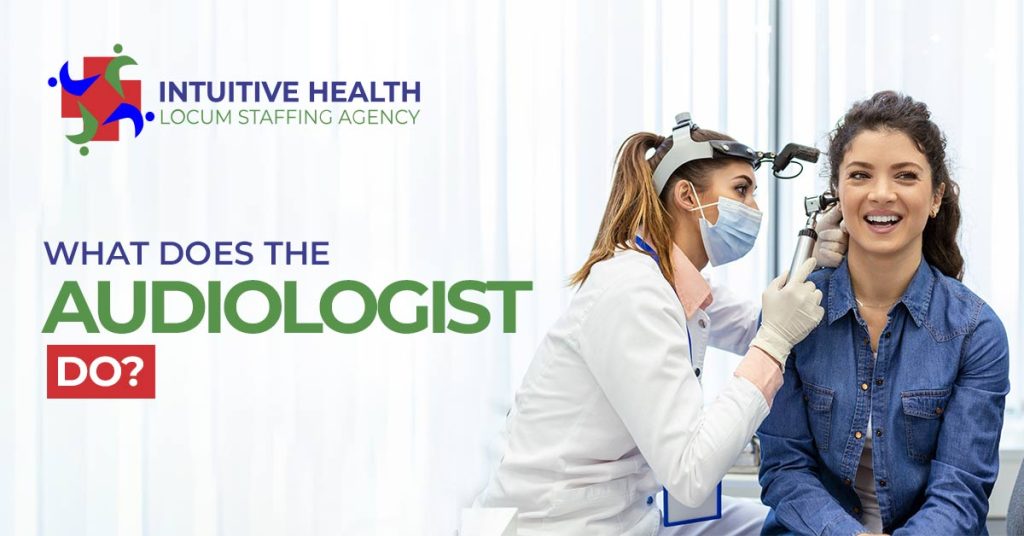Hearing connects us to the world. Conversations, music, endless laughter, and everyday noises make us feel normal. However, this is not the same for a large chunk of the population. Many people struggle with understanding conversations, listening to their favorite songs, and dizziness, making their lives frustrating. But they don’t know where and when to turn for help.

That’s where audiologists come in. These highly trained individuals diagnose and treat hearing loss, balance disorders, and related conditions to help people reconnect with the world around them.
In this blog, we’ll explore what audiologists do, when to see one, and how their care can positively impact your quality of life.
Who Is an Audiologist?
An audiologist, also known as a hearing specialist or doctor of audiology, is a healthcare professional who specializes in hearing, balance, and related disorders. They do much more than just test your hearing. Audiologists diagnose hearing loss, fit hearing aids, and help with balance problems caused by inner ear issues. Most audiologists in the U.S. hold a Doctor of Audiology degree (Au.D.) and are licensed to provide medical-grade hearing care.
Audiologists work in various places. You might find them in hospitals, hearing clinics, private practices, or even schools. Their role is to improve your ability to hear and understand sounds, which helps you communicate better and enjoy everyday life. They also educate patients on protecting their hearing and managing conditions like tinnitus and vertigo.
What Conditions Does an Audiologist Treat?
A Doctor of Audiology diagnoses and manages various conditions related to hearing, balance, and even understanding. Here are the common problems they treat:
Hearing Loss
Hearing loss is more common than you think. According to WHO, nearly 20% of the world’s population lives with hearing loss. It can happen when sound can’t reach the inner ear well, called conductive hearing loss. This might be caused by blockages or damage in the ear canal or middle ear.
Sometimes, the inner ear or the nerves sending sound to the brain don’t work properly. This is sensorineural hearing loss. It often comes from aging, loud noise, or illness. Some people have both kinds, known as mixed hearing loss. Hearing loss results in difficulty hearing speech and everyday sounds. It can affect people of all ages. However, against the popular belief, hearing loss is treatable and very much curable. Seeing an audiologist can help you with this condition.
Balance Problems
The inner ear helps keep your balance. When it is not working properly, you may feel dizzy or have vertigo. Vertigo feels like the room spins, making it hard to stand or walk. Audiologists are trained to find out what’s causing these balance problems. They use special tests to check how well your inner ear is working. Once they know what’s wrong, they can recommend treatments or exercises that help you feel more steady and safe.
Tinnitus or Ringing in the Ear
Tinnitus means hearing sounds like ringing or buzzing that aren’t really there. Many people in the U.S. experience this. According to research by the National Library of Medicine, over one in four participants (21.6% of people) reported tinnitus. The ringing or buzzing can range from mild to very upsetting. Audiologists help reduce tinnitus effects with special therapies and counseling.
Auditory Processing
Sometimes, the ears hear sounds correctly, but the brain has trouble understanding them. This is what we call an auditory processing disorder. People with this condition struggle to follow speech, especially in noisy places.
Hearing specialists can check how well someone understands sounds. They do this with listening tests and simple activities. If there’s a problem, audiologists can help by suggesting ways to make listening easier—like practicing specific skills, changing the room’s setup to reduce noise, or using special tools that make sounds clearer.
Suggested Read: How Technology is Shaping Health Department Jobs?
When Should You See an Audiologist?
You should see an audiologist if you notice trouble hearing conversations, ringing in your ears, or frequent dizziness. If sounds seem muffled or you struggle to understand speech, especially in noisy places, it’s a good idea to get a hearing test. Audiologists also help with balance problems and tinnitus. Early checkups can catch issues before they worsen and improve your quality of life. Get help early if you want to prevent bigger problems and you maintain a healthy work-life balance
Suggested Read: Work-Life Balance in Health Department Jobs: Is It Possible?
What to Expect at Your First Audiology Appointment
Your first visit to an audiologist will be straightforward and helpful. First, the audiologist will ask about your hearing and balance history. You’ll be asked if you’ve experienced any hearing shifts, feelings of dizziness, buzzing in your ears, or problems understanding conversations.
Next, you’ll undergo hearing tests. These tests check how well you hear different sounds and pitches. Some assessments require you to listen and respond to sounds with headphones, and others look at how well your middle ear works. If balance is a concern, the audiologist may perform balance tests to see how well your inner ear works.
After testing, the audiologist will explain the results clearly. If you have hearing loss, they’ll discuss treatment options, like hearing aids or therapy. They’ll also answer any questions you have and help create a plan that fits your lifestyle.
Audiologist vs. ENT: What’s the Difference?
Many people get confused and use these terms interchangeably. Although both audiologists and ENT doctors help with ear problems, their roles are different. ENTs are medical doctors who treat ear diseases, infections, injuries, and perform surgeries. They can prescribe medicine and handle severe conditions.
On the other hand, audiologists focus on testing hearing, fitting hearing aids, and managing balance or tinnitus issues. They don’t perform surgery or prescribe medication. Audiologists and ENTs often work together in a team. In case you require hearing tests or hearing aids, an audiologist is the right choice. If you have infections or need surgery, you should see an ENT.
Both Audiologists and ENTs are highly sought after roles in healthcare. Here is a list of the top 10 high-demand health department jobs in the USA. Audiologists and ENTs consistently rank among the top healthcare roles. This is due to growing awareness of hearing health and an aging population that needs specialized care.
Education and Training of an Audiologist
Audiologists in the United States complete extensive education and hands-on training before practicing. This process ensures they are well-equipped to help patients with hearing, balance, and communication needs.
Here’s what you need to do if you aspire to become one:
- Bachelor’s Degree: Every audiologist’s journey begins with a four-year undergraduate degree. Most choose Communication Sciences and Disorders, Biology, Psychology, or Health Sciences majors. These programs cover speech and hearing basics, human anatomy, neuroscience, and behavioral sciences—laying the groundwork for graduate-level study.
- Doctor of Audiology (Au.D.): After graduation or a bachelor’s degree, students must enroll in a Doctor of Audiology (Au.D.) program. This graduate program typically takes four years to complete and is required in all 50 states of the USA. Programs are accredited by the Council on Academic Accreditation in Audiology and Speech-Language Pathology (CAA), part of the American Speech-Language-Hearing Association (ASHA).
The coursework includes:
- Anatomy and physiology of the auditory and vestibular systems
- Diagnostic procedures for hearing and balance disorders
- Hearing aid technology and cochlear implants
- Counseling and patient care practices
- Pediatric and geriatric audiology
- Supervised Clinical Experience: During the Au.D. program, students complete at least 1,820 hours of supervised clinical practicum. This includes working in hospitals, ENT clinics, private practices, and schools under licensed audiologists. The final year typically involves a full-time externship, where students function almost like residents under mentorship, seeing patients independently while still being supervised.
- National Praxis Exam in Audiology: After completing the Au.D. degree, candidates must pass the Praxis Examination in Audiology (administered by ETS). This exam tests knowledge in diagnostics, treatment planning, and professional ethics. A passing score is required for state licensure in most states.
- State Licensure: To legally practice, audiologists must apply for licensure through their state’s health or professional licensing board. Requirements may differ slightly by state but generally include:
- A passing score on the Praxis exam
- Submission of supervised clinical hours
- Completion of an accredited Au.D. program
- Fingerprinting and background checks (in some states)
Are you a licensed hearing specialist looking for high-paying roles? Explore flexible audiologist jobs near me and find the roles that match your requirements and expertise.
- Optional Board Certification: Some audiologists pursue board certification to show advanced knowledge and commitment. Examples include:
- Certificate of Clinical Competence in Audiology (CCC-A) from ASHA
- Board Certification in Audiology from the American Board of Audiology (ABA)
These credentials are not legally required, but can boost professional reputation and open additional job opportunities.
- Continuing Education: Most states require licensed audiologists to complete a set number of Continuing Education Units (CEUs) every year or two to renew their license. This keeps their skills and knowledge aligned with the latest trends in audiology technology, clinical methods, and research.
Suggested Read: The Essential Skills Needed for Health Department Jobs
Build a Rewarding Audiology Career with Intuitive Health Services
Audiologists make a real difference in people’s lives by helping them hear better and feel more balanced. They help people reconnect with loved ones, manage dizziness, and find relief from constant ringing in the ears. Their work supports confidence, safety, and everyday connection.
If you’re thinking about pursuing a career in audiology, it offers a lot more than just a steady job. It combines science and treatment and is an excellent choice for people with good problem-solving and communication skills. Each day brings a new chance to help someone in a real and personal way, making it fulfilling and purposeful.
At Intuitive Health Services, we help licensed audiologists find flexible, high-paying roles across the country. Whether you’re newly certified or an experienced professional, our team connects you with opportunities that match your skills and goals. We provide the resources, connections, and support you need to move forward with confidence in your career.
Ready to move forward in your audiology career? Reach out to America’s leading healthcare staffing agency and take the next step today.

